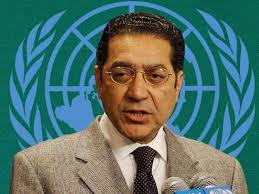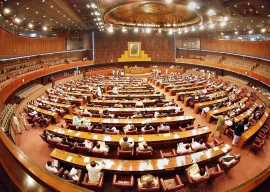
Pakistan has stressed the need for clarifying the "rule of law", saying the much-advocated principle that it applies equally to everyone is being obliterated by the actions of some countries, especially Israel, which is currently engaged in its "genocidal war" against Palestine and the Middle East.
"Today, we are witnessing before our eyes the destruction of the 'rule of law' at the international level, especially in the genocidal war which Israel has imposed on the people of Palestine and the Middle East," Ambassador Munir Akram, permanent representative of Pakistan to the UN., told the General Assembly's Sixth Committee, which deals with legal matters.
"We are witnessing this also in the violations of International Humanitarian Law; in the dismantling of the treaties for arms control and disarmament; in the massive violations of human rights of peoples under foreign occupation; in the violence and discrimination against religions and ethnic minorities; in targeted assassinations in third countries," he said in a debate on: The Rule of law at the National and International levels.
"And, yet, some countries, complicit in this erosion of international law, continue to advocate adherence to this "rule of law" but only as they interpret and apply it," Ambassador Akram added.
The Committee must contribute to restoring world order by classifying and clarifying what is or is not the 'law' as mentioned in the phrase: 'Rule of Law', the Pakistani envoy said, posing questions: "What is the relationship between national and international law? And, whether the applicable laws are being applied and observed or are being violated."
Most other speakers in the debate underscored the need for inclusion and equal participation in systems that provide law and justice - for all individuals at the national level and all States at the international one, saying, "It is crucial to upholding the rule of law."
In his remarks, Ambassador Akram said the UN Charter, especially its basic principles such as the right to self-determination; the sovereignty of States and their territorial integrity; non-use or threat of use of force; non-interference in internal affairs; non-acquisition of territory by the use of force, forms the most prominent body of "Rule of Law". He said it was disturbing to note that some states opposed these basic principles and consequently they do not figure in the Pact for the Future, which was adopted by world leaders last month.
Besides the Charter, the rule of law includes international treaties, such as the Geneva Conventions, international disarmament treaties and human rights conventions, it was pointed out.
Next, under the UN Charter, all Member States are legally obliged to implement UN Security Council decisions.
Solemn international declarations adopted by the UN General Assembly, with wide support from Member States like the Declaration on Decolonization and the Declaration on Friendly Relations among States and the Universal Declaration on Human Rights – have all acquired the status of international "Common Law" and must be observed, the Pakistani envoy said, adding that the work of the International Court of Justice through its case law and Advisory Opinions also constitute the corpus of the laws that are part of "the rule of law".



1728375367-0/diddy-(25)1728375367-0-165x106.webp)






1726722687-0/Express-Tribune-Web-(9)1726722687-0-270x192.webp)







COMMENTS
Comments are moderated and generally will be posted if they are on-topic and not abusive.
For more information, please see our Comments FAQ